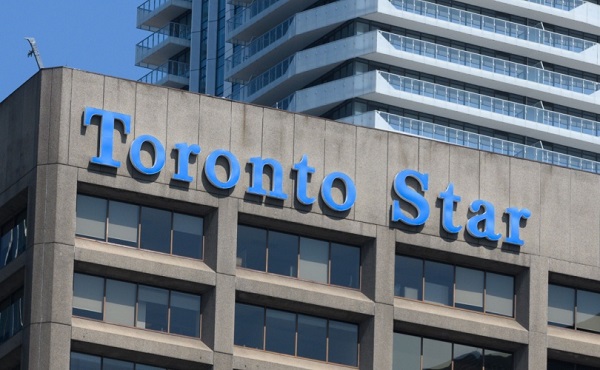Business
Trudeau gov’t suggests federal funding of media outlets an attempt to buy ‘social cohesion’

From LifeSiteNews
The Liberal-run Heritage Department is backing a program that offers 100% payroll rebates for mainstream journalists.
Canadian Heritage Minister Pascale St-Onge’s department admitted that federally funded media outlets buy “social cohesion.”
According to information obtained October 7 by Blacklock’s Reporter, the Canadian Association of Journalists praised a program from Canada’s Heritage Department, run by the Liberal St-Onge, that offers 100% payroll rebates for mainstream journalists.
“The crisis in local journalism is a threat to social cohesion,” the report claimed, failing to explain what it meant by “social cohesion.”
The report praised the Local Journalism Initiative and the rebates for mainstream media up to $19.6 million annually, effectively making federally funded journalists government employees.
“The Local Journalism Initiative contributes to social cohesion by having journalists tell stories about and for communities,” the report continued. “Local journalism helps to preserve a sense of community identity and social cohesion.”
“Local journalism relays information that has an impact on the daily lives of readers and reports on the political and social situation,” it claimed.
“It strengthens the reader’s connection to a community, emphasizing their role as a citizen in a democracy,” the report continued. “With the ever-increasing influx of digital information, local journalism is of paramount importance in the life of a community.”
While the report failed to explain exactly what “social cohesion” means, media funded by the Prime Minister Justin Trudeau’s government has become infamous for propping up the Liberals while tearing down any opposition to the party or its radical agendas.
In fact, in September, House leader Karina Gould directed mainstream media reporters to “scrutinize” Conservative Party leader Pierre Poilievre, who has repeatedly condemned government-funded media as being an arm of the Liberals.
Gould’s comments were in reference to Poilievre’s promise to defund the Canadian Broadcasting Corporation (CBC) if elected prime minister. Poilievre is a longtime critic of government-funded media, especially the CBC.
Indeed, there have been multiple instances of the CBC pushing what appears to be ideological content, including the creation of pro-LGBT material for kids, tacitly endorsing the gender mutilation of children, promoting euthanasia, and even seeming to justify the burning of mostly Catholic churches throughout the country.
Despite this, beginning in 2019, Parliament changed the Income Tax Act to give yearly rebates of 25 percent for each news employee in cabinet-approved media outlets earning up to $55,000 a year to a maximum of $13,750.
The Canadian Heritage Department since admitted that the payouts are not even sufficient to keep legacy media outlets running and recommended that the rebates be doubled to a maximum of $29,750 annually.
Last November, Trudeau again announced increased payouts for legacy media outlets that coincide with the leadup to the 2025 election. The subsidies are expected to cost taxpayers $129 million over the next five years.
Similarly, Trudeau’s 2024 budget outlined $42 million in increased funding for the CBC in 2024-25.
The $42 million to the CBC is in addition to massive media payouts that already make up roughly 70 percent of its operating budget and total more than $1 billion annually.
Alberta
Emissions Reduction Alberta offering financial boost for the next transformative drilling idea

From the Canadian Energy Centre
$35-million Alberta challenge targets next-gen drilling opportunities
‘All transformative ideas are really eligible’
Forget the old image of a straight vertical oil and gas well.
In Western Canada, engineers now steer wells for kilometres underground with remarkable precision, tapping vast energy resources from a single spot on the surface.
The sector is continually evolving as operators pursue next-generation drilling technologies that lower costs while opening new opportunities and reducing environmental impacts.
But many promising innovations never reach the market because of high development costs and limited opportunities for real-world testing, according to Emissions Reduction Alberta (ERA).
That’s why ERA is launching the Drilling Technology Challenge, which will invest up to $35 million to advance new drilling and subsurface technologies.
“The focus isn’t just on drilling, it’s about building our future economy, helping reduce emissions, creating new industries and making sure we remain a responsible leader in energy development for decades to come,” said ERA CEO Justin Riemer.
And it’s not just about oil and gas. ERA says emerging technologies can unlock new resource opportunities such as geothermal energy, deep geological CO₂ storage and critical minerals extraction.
“Alberta’s wealth comes from our natural resources, most of which are extracted through drilling and other subsurface technologies,” said Gurpreet Lail, CEO of Enserva, which represents energy service companies.
ERA funding for the challenge will range from $250,000 to $8 million per project.
Eligible technologies include advanced drilling systems, downhole tools and sensors; AI-enabled automation and optimization; low-impact rigs and fluids; geothermal and critical mineral drilling applications; and supporting infrastructure like mobile labs and simulation platforms.
“All transformative ideas are really eligible for this call,” Riemer said, noting that AI-based technologies are likely to play a growing role.
“I think what we’re seeing is that the wells of the future are going to be guided by smart sensors and real-time data. You’re going to have a lot of AI-driven controls that help operators make instant decisions and avoid problems.”
Applications for the Drilling Technology Challenge close January 29, 2026.
armed forces
Global Military Industrial Complex Has Never Had It So Good, New Report Finds


From the Daily Caller News Foundation
The global war business scored record revenues in 2024 amid multiple protracted proxy conflicts across the world, according to a new industry analysis released on Monday.
The top 100 arms manufacturers in the world raked in $679 billion in revenue in 2024, up 5.9% from the year prior, according to a new Stockholm International Peace Research Institute (SIPRI) study. The figure marks the highest ever revenue for manufacturers recorded by SIPRI as the group credits major conflicts for supplying the large appetite for arms around the world.
“The rise in the total arms revenues of the Top 100 in 2024 was mostly due to overall increases in the arms revenues of companies based in Europe and the United States,” SIPRI said in their report. “There were year-on-year increases in all the geographical areas covered by the ranking apart from Asia and Oceania, which saw a slight decrease, largely as a result of a notable drop in the total arms revenues of Chinese companies.”
Notably, Chinese arms manufacturers saw a large drop in reported revenues, declining 10% from 2023 to 2024, according to SIPRI. Just off China’s shores, Japan’s arms industry saw the largest single year-over-year increase in revenue of all regions measured, jumping 40% from 2023 to 2024.
American companies dominate the top of the list, which measures individual companies’ revenue, with Lockheed Martin taking the top spot with $64,650,000,000 of arms revenue in 2024, according to the report. Raytheon Technologies, Northrop Grumman and BAE Systems follow shortly after in revenue,
The Czechoslovak Group recorded the single largest jump in year-on-year revenue from 2023 to 2024, increasing its haul by 193%, according to SIPRI. The increase is largely driven by their crucial role in supplying arms and ammunition to Ukraine.
The Pentagon contracted one of the group’s subsidiaries in August to build a new ammo plant in the U.S. to replenish artillery shell stockpiles drained by U.S. aid to Ukraine.
“In 2024 the growing demand for military equipment around the world, primarily linked to rising geopolitical tensions, accelerated the increase in total Top 100 arms revenues seen in 2023,” the report reads. “More than three quarters of companies in the Top 100 (77 companies) increased their arms revenues in 2024, with 42 reporting at least double-digit percentage growth.”
-

 Energy17 hours ago
Energy17 hours agoCanadians will soon be versed in massive West Coast LPG mega-project
-

 Alberta1 day ago
Alberta1 day agoNet Zero goal is a fundamental flaw in the Ottawa-Alberta MOU
-

 Alberta1 day ago
Alberta1 day agoKeynote address of Premier Danielle Smith at 2025 UCP AGM
-

 Food1 day ago
Food1 day agoCanada Still Serves Up Food Dyes The FDA Has Banned
-

 Addictions1 day ago
Addictions1 day agoManitoba Is Doubling Down On A Failed Drug Policy
-

 National2 days ago
National2 days agoEco-radical Canadian Cabinet minister resigns after oil deal approved
-

 COVID-191 day ago
COVID-191 day agoFDA says COVID shots ‘killed’ at least 10 children, promises new vaccine safeguards
-

 Daily Caller17 hours ago
Daily Caller17 hours agoTom Homan Predicts Deportation Of Most Third World Migrants Over Risks From Screening Docs




